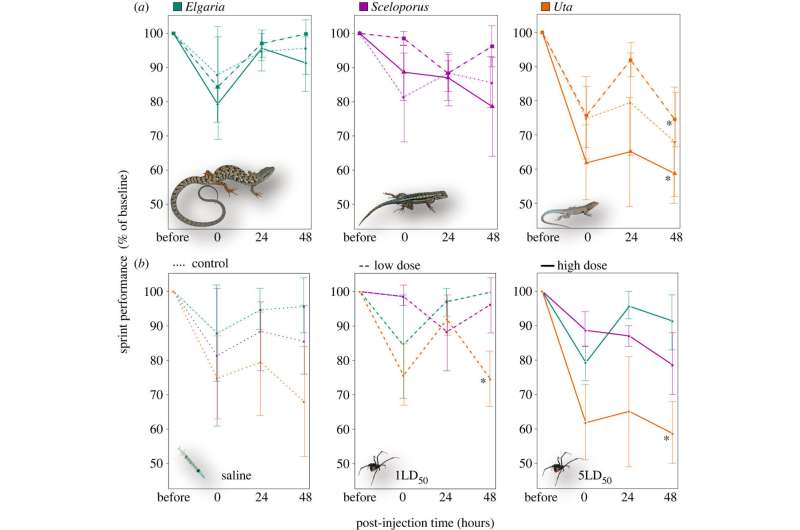A step closer to understanding why some lizards are immune to black widow spider venom

A team of researchers at the University of Nevada has taken a step toward understanding how it is some lizards are able to withstand a black widow spider bite with few to no ill effects. In their paper published in the journal Royal Society Open Science, the group describes how they injected several species of lizards with black widow venom and then took a close look to see how they responded.
Prior research has shown that the black widow spider is one of the most poisonous spiders in North America. Luckily, black widow spiders are not hostile and thus do not attack humans and they also produce very little venom. Because of that, very few people have ever died from a bite.
Prior research and anecdotal evidence has also shown that some lizards not only are not bothered by black widows but actively seek out the spiders as a food source. In this new effort, the researchers sought to learn more about such lizards to find out if their ability to withstand black widow bites might offer some clues for better treating humans who have been bitten.
The work by the researchers started with them going out into the field and collecting several specimens of three types of lizards: alligator, Western fence and side-blotched. The first two are known to be immune to black-widow spider bites while the third is very susceptible—they die if bitten.
The researchers then injected several of each of the three types of lizards with black widow venom and then set them down on a small racecourse and encouraged them to run. Both the alligator and Western fence were able to do so, while the side-blotched were not.
The researchers then dissected several of each of the lizards after injecting them with the venom. They noted that prior research has shown that creatures adversely impacted by black widow spider bites suffer from tissue and muscle damage. They found such damage in both the side blotched and Western fence but none in the alligator. Taking a closer look, the researchers discovered that there were no signs at all that the alligator lizards had been injected with the venom.
The researchers note that the lack of reaction to the venom by the alligator lizards suggests that they have a very strong protection mechanism. They note that some other species of animals have evolved a known mechanism to protect against venom—king snakes, for example, are immune to rattlesnake venom.
They have something in their blood that binds to the venom, neutralizing it. The researchers suggest it is likely the alligator lizards have something similar. They will not know what it is, however, until the genome of the lizard is sequenced.
No comments:
Post a Comment